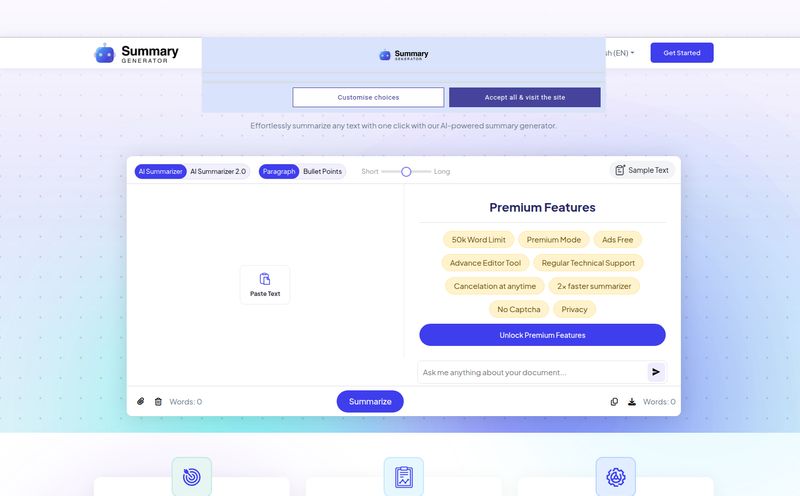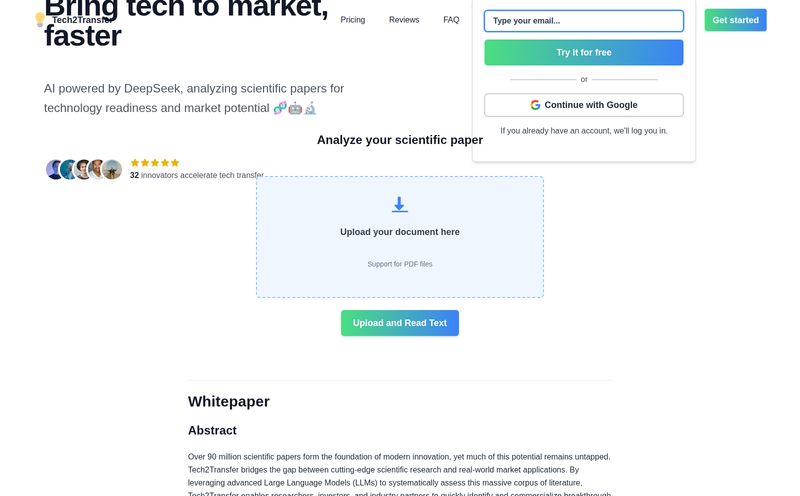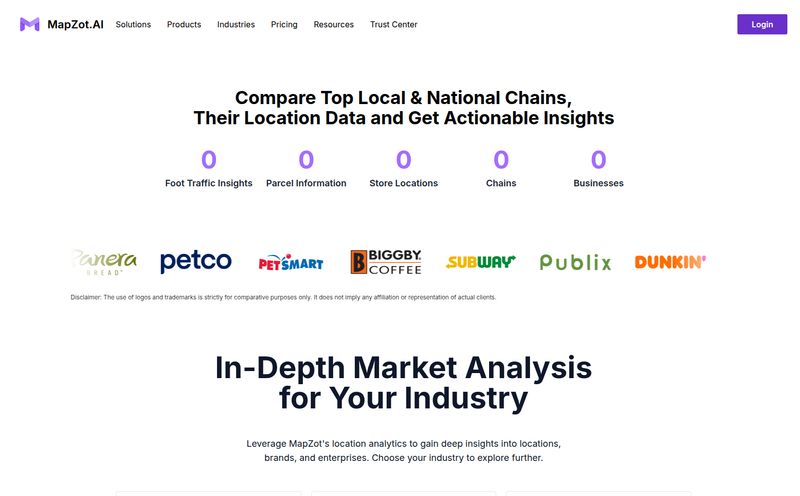If you’ve ever tried to seriously research a stock, you know the feeling. You start with a simple goal: "Should I invest in Company X?" An hour later, you have 27 browser tabs open. You're knee-deep in an SEC filing that reads like a legal textbook, you’ve skimmed a dozen contradictory news articles, and you’re trying to decipher what some rando on Reddit named ‘DiamondHandz420’ actually means. It's information overload. It’s a mess.
For years, as an SEO and data guy, my job has been about finding the signal in the noise. It’s about cutting through the fluff to find what actually matters. So when I heard about Quordata, a tool that claims to use AI to do exactly that for investment research, my curiosity was definitely piqued. An AI that reads all the boring stuff and just gives me the highlights? Sign me up. But does it actually work, or is it just another tech gimmick?
So, What Exactly Is This Quordata Thing?
Think of Quordata as your personal, on-demand research assistant. It's an app designed to take the grunt work out of analyzing publicly traded companies. Instead of you spending hours sifting through reports, articles, and social media chatter, Quordata's AI does it for you. It pulls in massive amounts of text data from all over the web, chews on it for a second, and then spits out a summary you can actually understand. In plain English.
Its main promise is to give you actionable insights in about 30 seconds. A bold claim, I know. It's not about telling you to 'buy' or 'sell'—it's about arming you with a condensed, intelligent overview so you can make a much more informed decision yourself. It’s like having a translator for the chaotic language of the stock market.
My First Spin: Cutting Through the Market Noise
I decided to take it for a test drive. The interface is clean, almost deceptively simple. You get a search bar. That's it. I typed in a popular tech company I’ve been following and hit enter.
What came back wasn't a dense wall of text. It was a dashboard. A clean, custom dashboard that immediately gave me the lay of the land. It presented an executive summary, a breakdown of key topics being discussed about the company, and a sentiment analysis graph. It felt... calm. Organized. For the first time, I wasn't drowning in data; I was looking at it from a 30,000-foot view.

Visit Quordata
The AI-generated summary was the first thing I read. It was surprisingly coherent. It pulled out the main drivers and concerns from recent reports without the corporate jargon. This alone is a huge win for anyone who doesn't have a finance degree.
The Core Features That Actually Matter
A lot of tools boast about a long list of features, but only a few really move the needle. Here’s what stood out to me in Quordata.
AI-Powered Sentiment Analysis: The Market's Mood Ring
If the GameStop saga taught us anything, it’s that market sentiment—the overall feeling or attitude of investors—is a powerful force. Quordata uses AI to scan news, social media, and forums to gauge this mood. It tells you whether the chatter is positive, negative, or neutral and shows you how that trend has changed over time. It's like a mood ring for a stock. In today's meme-driven market, this kind of sentiment analysis for stocks isn't just nice to have; it can be a critical piece of the puzzle.
Data Aggregation Without the Migraine
I’ve lost entire weekends to compiling data. Pulling numbers from a 10-K report, cross-referencing them with a press release, then trying to see how that lines up with recent news coverage. It's tedious work. Quordata automates this. It vacuums up information from all these different sources and puts them in one place. You can even see the composition of sources, so you know if the buzz is coming from formal financial news or just Twitter chatter. That context is everything.
Executive Summaries for the Rest of Us
Let's be honest, nobody enjoys reading a 100-page annual report. It's a necessary evil. Quordata’s AI reads it for you and writes a summary. It’s the ultimate Cliff's Notes for investors. This feature makes complex financial information accessible. You get the gist without the grind, freeing you up to think about strategy rather than getting bogged down in terminology.
Lets Talk Brass Tacks: Quordata Pricing
So, what's this going to cost? This is where I was pleasantly surprised. They have a model that lets you get started without opening your wallet.
Here's the breakdown:
- BASIC (Free): You get access to the core features for up to 10 company searches a month. This includes real-time social sentiment metrics and the basic analysis. It's a fantastic way to see if the tool fits your workflow. No brainer to try this first.
- PRO ($9.99/month): For ten bucks a month, the training wheels come off. You get unlimited company searches, the more advanced AI-driven analysis, and priority access to new features.
In my opinion, the $9.99 price point for the Pro plan is pretty reasonable. Think about the value of your time. If this tool saves you even one or two hours of frustrating research a month, it’s already paid for itself. Compared to some of the high-end institutional platforms that cost thousands, this puts some serious AI investment research power in the hands of the average person.
The Good, The Bad, and The AI-Generated
No tool is perfect. Let's get into the nitty-gritty. After using it for a bit, here's my balanced take.
What I Liked
The speed is incredible. Getting a comprehensive overview of a company in under a minute feels like a superpower. The platform genuinely succeeds in its mission to simplify investment research. It turns a mountain of chaotic data into a digestible molehill. And I love the focus on sentiment; it feels very modern and attuned to how markets actually work now.
What Could Be Better
Now, for the caveats. Some might argue that relying purely on an AI for analysis is risky, and they're not totally wrong. The analysis is only as good as the data it’s fed. If the public conversation is dominated by low-quality sources, the AI's insights could reflect that. It’s a classic “garbage in, garbage out” scenario. The platform is also heavily reliant on text data. It won't be able to analyze, say, the body language of a CEO in a video interview or the implications of a new patent diagram. Its a tool for a specific kind of analysis, not a crystal ball.
And yes, the Pro plan is a monthly subscription. I know some folks have subscription fatigue, but for an active investor, the cost seems trivial compared to the potential upside of making better-informed trades.
Who is Quordata Actually For?
So, who should be rushing to sign up? In my experience, Quordata is a near-perfect stock market analysis tool for a few types of people:
- The Busy Professional: You have a career, a family, a life. You don’t have 20 hours a week to pour into research, but you want to actively manage your investments. This tool is your shortcut.
- The New Investor: If you're just starting and find the world of financial reports intimidating, Quordata is an amazing educational bridge. It helps you understand the key points without the scary jargon.
- The Thematic Investor: If you like to invest based on trends (like AI, green energy, etc.), this is a quick way to get up to speed on multiple companies in a specific sector.
Who is it not for? Probably the hardcore, old-school value investor who lives and breathes financial statements and trusts only their own manual, multi-week deep dives. And that’s fine. This isn't meant to replace that level of forensic analysis; it's meant to augment and accelerate the process for everyone else.
My Final Take on This AI Stock Detective
So, what’s the verdict? I’m genuinely impressed. Quordata isn't just another app; it's a smart solution to a very real problem. It successfully lowers the barrier to entry for serious investment research and gives individual investors a taste of the analytical power that was once reserved for big firms.
It’s crucial to remember that it's a tool to aid your judgment, not replace it. It provides the 'what' and the 'why' incredibly fast, but you still need to make the final call. But by handling the most time-consuming part of the process, it gives you back your most valuable asset: time to think. In a market that moves at the speed of light, that might just be the best edge you can get.
Your Quordata Questions Answered
What is Quordata in simple terms?
Quordata is an AI-powered app that reads and analyzes vast amounts of public information about stocks (like news, reports, and social media) and provides you with simple, easy-to-understand summaries and insights to help you make informed investment decisions quickly.
Is Quordata's AI analysis accurate?
The accuracy depends on the quality of the source data the AI analyzes. It's very good at summarizing text and identifying sentiment and key topics from reliable sources. However, it's a tool for insight, not a source of absolute truth. You should always use it as part of a broader research strategy.
Is there a free version of Quordata?
Yes, Quordata offers a free Basic plan that allows you to analyze up to 10 companies per month, giving you a great opportunity to test its features before committing to the paid plan.
Can Quordata replace a financial advisor?
No. Quordata is a research tool designed to provide data and analysis to help you make your own decisions. It does not provide personalized financial advice, which is the role of a qualified human financial advisor.
What kind of data does Quordata analyze?
Quordata primarily analyzes text-based data from a wide range of public sources, including SEC filings, financial news websites, press releases, and social media platforms like Twitter and Reddit.
How does Quordata help with investment decisions?
It helps by saving you massive amounts of time on research, simplifying complex financial documents into plain English, and providing unique insights on market sentiment that are difficult to gauge manually. This allows you to base your decisions on a wider, more organized set of information.
Reference and Sources
- Quordata Official Website
- Quordata Pricing Information
- Sentiment Analysis in Financial Markets - Investopedia



